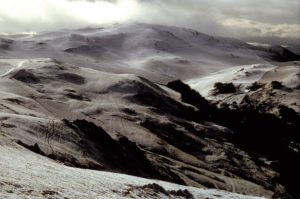by Martin Meeker
@MartinDMeeker
Recording, transcribing, and making oral histories accessible represents only a portion of the work that we do at the Oral History Center. We relish the opportunity to engage with these raw historical materials and fashion them into a variety of interpretative works too.
The 4,000 oral histories in our collection have been used by OHC staff in the writing of conference papers, articles, and books for sure. And while we remain committed to our mission of creating quality first-person historical accounts that might be used in the most rigorous of academic studies, we also recognize—and applaud—the use of these interviews across a much broader field. Now, OHC interviews are used in podcasts, documentary films, dramatic productions, and more.

As the ability to preserve, edit, and distribute audio and video productions becomes ever easier, ever more democratized, we at OHC have also utilized these resources to create videos and podcasts that draw heavily upon the collection. We are on the verge of releasing our fifth podcast season, Hidden Heroes. This one focuses on the East Bay Regional Park District and is being produced by Shanna Farrell and Francesca Fenzi. Previous seasons have looked at the history of the University of California at 150 years, the early response to AIDS in San Francisco, and the long history of women in politics.
Our main goal with these podcasts is to offer robust yet widely accessible narrative interpretations—pivotal moments in history that our collection can illuminate. We are historians, and this is what we do. But we also have an important alternate motivation (or two) in spending hundreds of hours required to produce these podcasts. While our 4,000 oral histories (amounting to tens of thousands of hours of interviews) are readily accessible through our website, we are well aware that, say, a 30 hour interview with a scientist might be a tad overwhelming and many who could find something of real value in these life histories might never know to look there. With these podcasts and the many other interpretive materials we create, we are seeking to distribute breadcrumbs around the internet—breadcrumbs that might lead users back to the collection and back to the lengthy but otherwise invisible oral histories. We know that there are many people who are passionate about history but who aren’t trained researchers. These breadcrumbs help steer these folks toward these free and substantive and lively interviews.
I know I can speak for the whole oral history team at Berkeley that we endeavor not just to create excellent interviews in collaboration with our narrators but that we strive to make that work known to the widest public possible.